Key takeaways:
- Indie film criticism emphasizes exploring deep emotional connections and social commentary, often through unique storytelling that challenges mainstream narratives.
- Analyzing indie film genres reveals how these films often subvert traditional norms, creating relatable narratives that reflect societal issues.
- Developing a critical perspective involves active listening, emotional reflection, and community engagement, which enriches the understanding and appreciation of films.
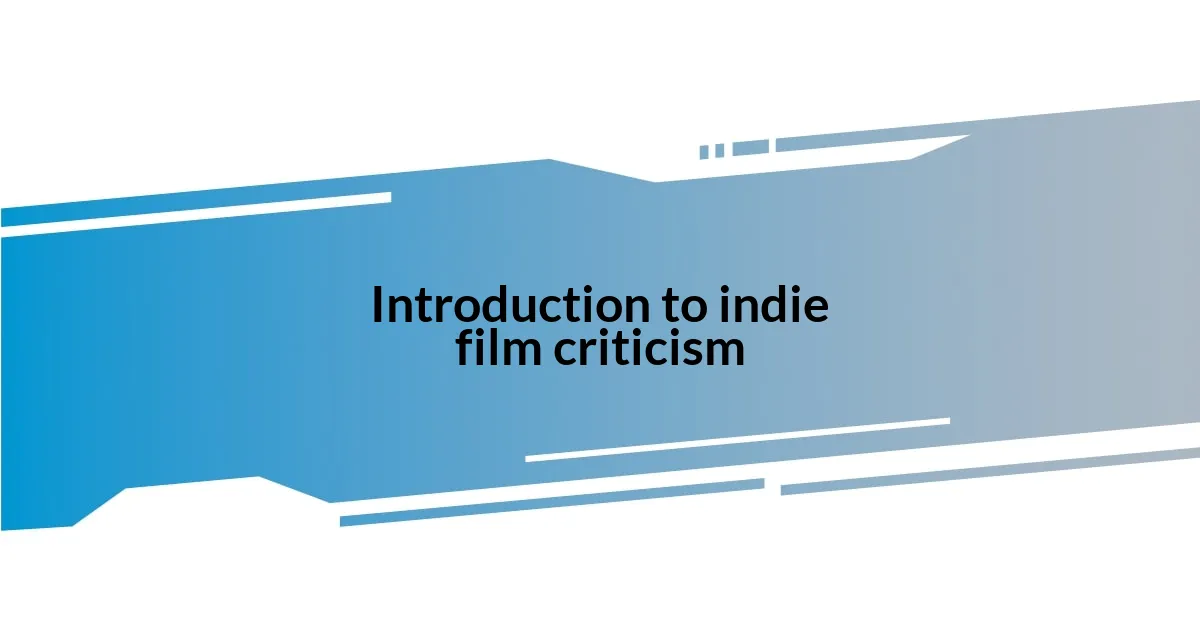
Introduction to indie film criticism
Indie film criticism offers a unique lens through which we can explore cinema, often presenting stories that mainstream films overlook. I still remember the first time I stumbled upon a small indie film festival, and the raw emotion in those films struck a chord with me. It made me realize how different and powerful independent storytelling could be.
As a critic in this niche, I often find myself diving deep into the undercurrents of a film, analyzing not just the plot but the emotions and social commentary woven into the fabric of its narrative. Have you ever watched a film that lingered in your mind long after the credits rolled? Indie films often evoke that kind of reaction, compelling me to reflect on my own experiences and perspectives.
I’ve encountered a range of indie films that challenge the status quo, from poignant documentaries to avant-garde narratives. Each film becomes a conversation starter, inviting me to examine not only its themes but also how it fits into broader cultural conversations. In this world of indie film criticism, I feel a sense of community and passion for uncovering the hidden gems that deserve to be seen and discussed.
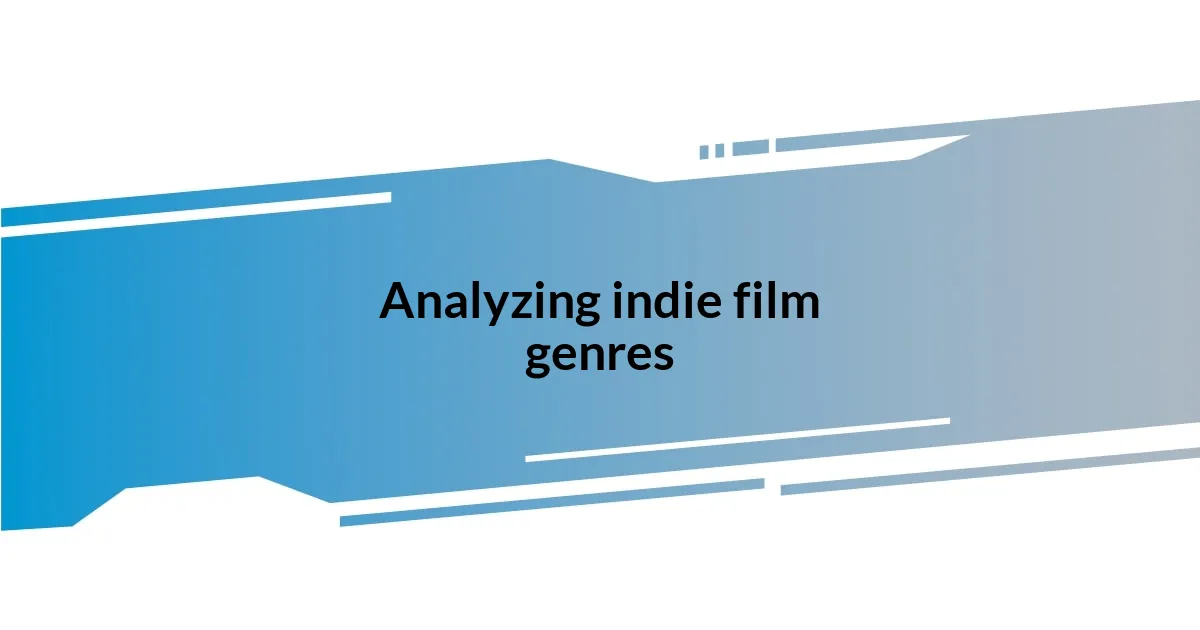
Analyzing indie film genres
Analyzing the spectrum of indie film genres has been a fascinating journey for me. I’ve discovered how each genre carries its own unique voice and audience. For instance, the way a horror indie film can tap into existential fears is vastly different from the heartwarming narratives found in indie romantic comedies. I remember sitting through a chilling indie horror film that left me breathless, far removed from the jump scares of mainstream horror. It was hauntingly beautiful in its subtlety and depth, altering my perception of what fear can truly convey.
What I’ve noticed is that indie films often breathe new life into traditional genres. They subvert norms and create fresh interpretations that can feel more relatable. For example, an indie film might explore science fiction not just as a space adventure but as a reflection on societal issues. I was particularly moved by one such film that weaves storylines about climate change into an unexpected narrative about love and relationships. This blend not only entertained but also sparked a deeper conversation around real-world issues, making me appreciate the genre’s capacity for change and impact.
When I analyze indie film genres, I find meaningful patterns that reveal the filmmakers’ intentions and cultural commentary. Each genre embraces personal experiences and societal reflections, giving them a unique authenticity. The emotional engagement is often raw and profound, leading to a shared experience that connects viewers beyond just the screen. I remember discussing one such film with a friend, and we both walked away with a renewed sense of understanding for the struggles that the characters portrayed. Those moments make indie film criticism a fulfilling part of my life.
| Genre | Characteristics |
|---|---|
| Drama | Focus on character-driven stories, often exploring intense emotions and social issues. |
| Comedy | Subtle humor, often with a focus on relationships, social dynamics, and personal growth. |
| Horror | Utilizes psychological tension, often centered on existential fears rather than traditional scare tactics. |
| Science Fiction | Explores societal concerns through speculative narratives, offering fresh takes on familiar tropes. |
| Documentary | Presents real-life stories and issues with often poignant emotional resonance. |
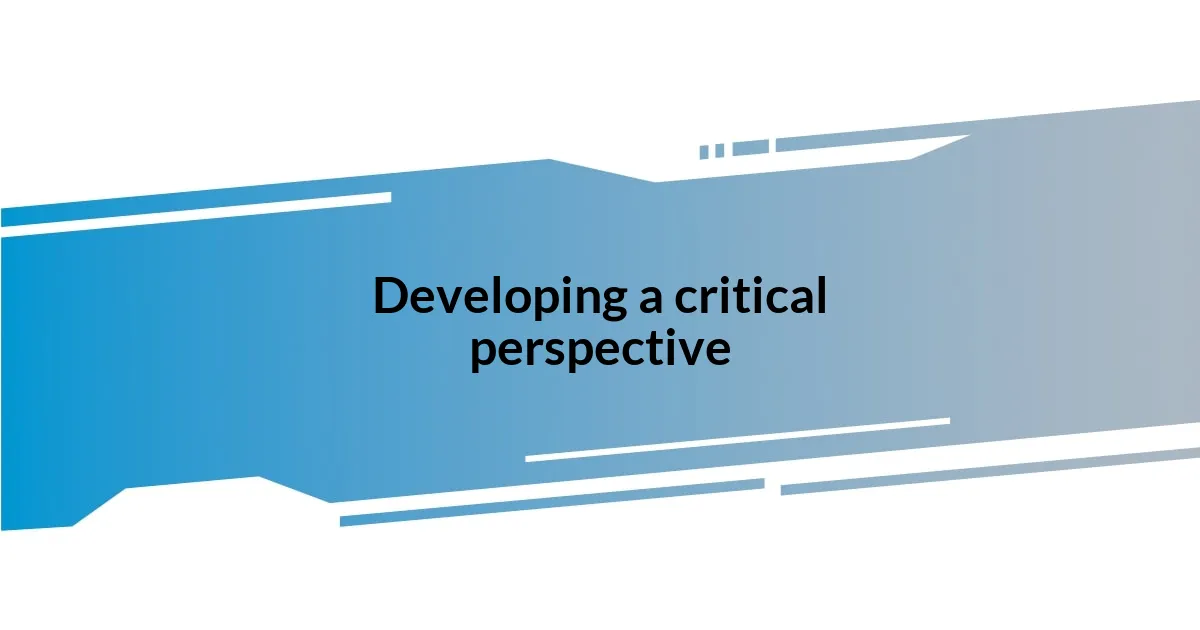
Developing a critical perspective
Developing a critical perspective in indie film criticism has been an enlightening journey. It’s not just about watching films; it’s about immersing myself in the entire experience. I often find that as I watch, I take mental notes of the director’s choices, the subtleties in cinematography, and the emotional currents that pulse through the narrative. One evening, after watching a quiet indie drama, I recalled sitting in my living room, feeling an overwhelming sense of empathy for the protagonist. It made me ponder how films can so vividly mirror our own emotional landscapes.
Cultivating a critical eye involves honing several key skills:
- Active Listening: I pay attention to dialogues and how they reveal character motivations.
- Contextual Understanding: Knowing the cultural and social backdrop helps illuminate a film’s message.
- Emotional Reflection: I strive to connect with how the film makes me feel, deepening my overall appreciation.
- Comparative Analysis: I often think about how a film stands against both indie and mainstream works to understand its unique contribution.
- Engagement with Community: Discussions with fellow cinephiles enrich my perspective, offering diverse viewpoints that reshape my understanding.
This blend of techniques has empowered me to find nuanced meanings that resonate on both personal and universal levels. Each film becomes more than just a viewing; it transforms into an exploration of life itself.
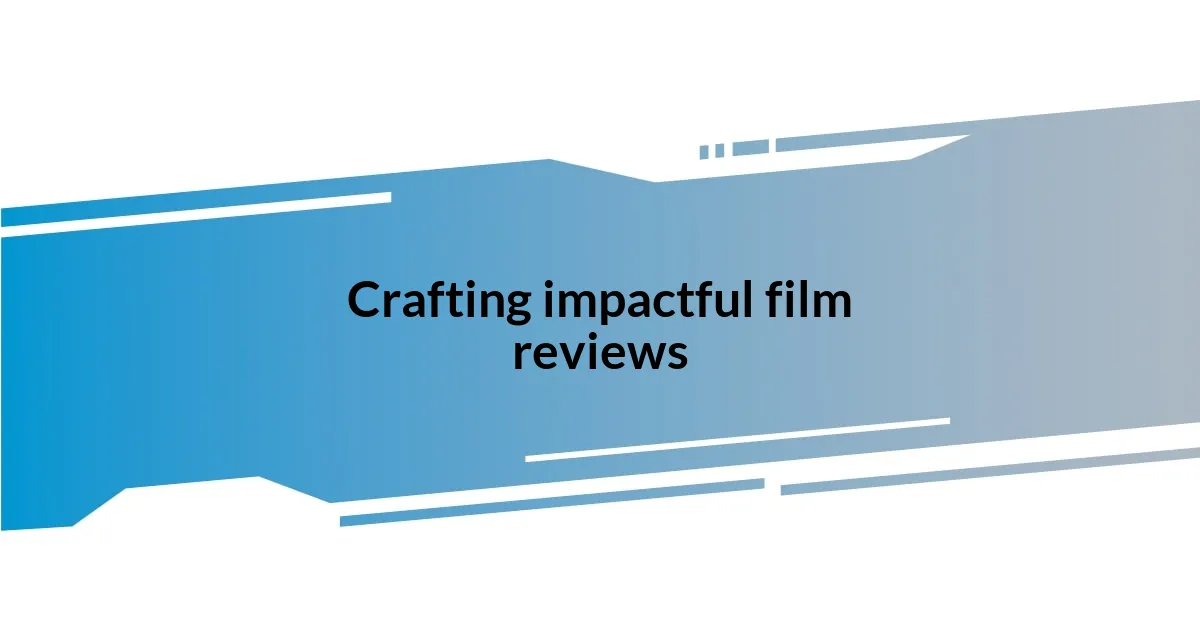
Crafting impactful film reviews
Crafting impactful film reviews requires a deep dive into the essence of a film. I always begin by asking myself, “What emotions did this film stir in me?” For example, after watching a heart-wrenching indie drama about loss, I felt a tangible connection to the characters. I reflected on my own experiences of grief, which allowed me to articulate those feelings in my review. This personal connection not only enriches my analysis but also helps readers feel the film viscerally through my words.
It’s essential to go beyond surface-level observations. I remember watching an indie film that used a unique narrative structure—jumping back and forth in time. Initially, it baffled me, but the more I contemplated its design, the clearer it became how this approach depicted the protagonist’s fragmented psyche. When I wrote my review, I drew parallels to real-life experiences where our past influences our present. Crafting reviews like this invites readers to think critically about the film’s choices and how they relate to their own lives.
I find that including specific examples from the film can make reviews significantly more compelling. For instance, in one indie thriller, a seemingly innocuous object—a vintage clock—became a symbol of the character’s regrets. Discussing how this device tied into the broader theme of time lost added depth to my review that resonated with the audience. This technique not only enriches my critique but also engages readers, prompting them to remember details they may have overlooked, creating a shared viewing experience.
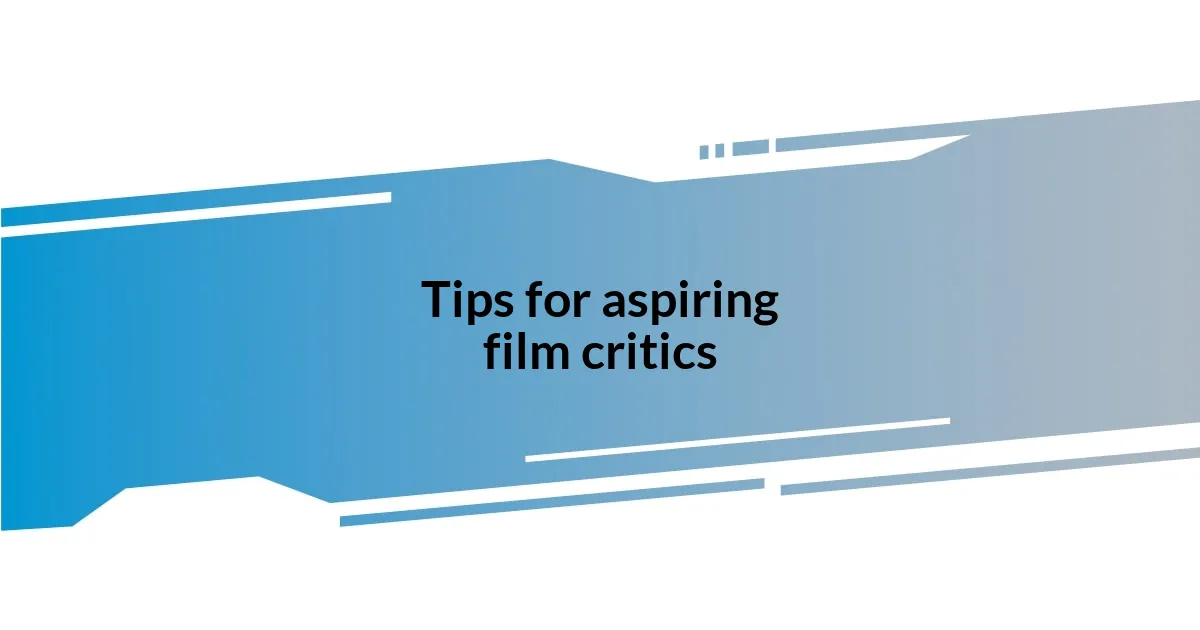
Tips for aspiring film critics
When I first started as a film critic, one of the most valuable tips I received was to watch films multiple times. I quickly realized that on a second or third viewing, I often spotted details I had missed the first time around. For instance, revisiting a quirky indie comedy allowed me to catch subtle jokes and visual gags that added depth to the overall experience. It’s a bit like savoring a good meal; each bite can reveal a new flavor or texture that enriches your understanding.
Another important aspect is to write regularly, even if it’s just a journal of your thoughts about films. I created a personal blog where I shared my musings, which helped me articulate my opinions clearly. Initially, my entries were rough and unpolished, but as I continued, I saw a transformation in my writing style. To this day, I think about how my early attempts shaped my voice, making me more attuned to the nuances of language and expression.
Lastly, networking with other critics and filmmakers can be incredibly enlightening. I remember attending a local film festival and engaging in conversations with others who shared my passion. Those discussions not only expanded my perspective but also sparked ideas that fueled my reviews. Have you found that interacting with others elevates your understanding of films? I have—it’s like opening a door to a world of insights that you didn’t even know existed.
